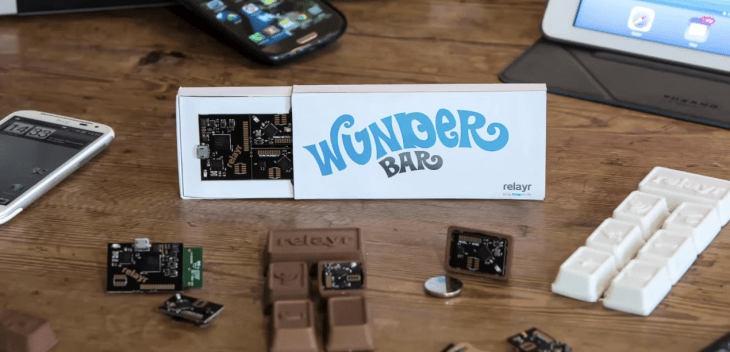Berlin-based relayr, maker of the WunderBar, an Internet of Things (IoT) hardware dev kit which resembles a chunky chocolate bar, has closed a $2.3 million seed round, from unnamed U.S. and Switzerland-based investors.
The startup had previously raised a €250,000 friend and family round, and had been on track to close a €500,000 seed earlier this year — but received a higher funding offer from a different set of investors, which is the $2.3M round it’s reporting today.
relayr said its new seed investment will be put towards expanding its presence in the U.S., with the startup having already established a foothold in North America, with plans for more growth and upping its visibility there (it’s recently been showcasing its kit at DroidCon NYC and the World Maker Faire). It’s not abandoning Berlin, though, and intends to relocate to a new, larger HQ in the German capital at the end of September to accommodate planned new hires to expand its 20-strong tech and community teams.
The startup took the wraps off its WunderBar kit at the start of this year, before launching a crowdfunding campaign, back in March, on the hardware-focused Dragon Innovation platform, with the aim of getting the kit into the hands of developers who want to get started building apps that talk to connected objects. The crowdfunder brought in more than $111,000.
relayr’s thinking — with the WunderBar — is that software devs might not be quite so comfortable wrangling soldering irons and chips as they are lines of code. And so furnishing them with a plug and play hardware kit, complete with SDKs and an API for easy interfacing, will smooth the way for app makers to become IoT app builders.
But the hardware dev kit is just one part of relayr’s vision; the larger play is a cloud services platform (that will be hardware agnostic), called the OpenSensor Cloud (OSC). In essence it wants its cloud to become a unifying platform for developers building IoT apps — acting as a central hub for data flows to and from connected sensors and the apps that leverage this data.
“WunderBar is an enabling tool and a short term revenue stream, but the priority and middle-term and long-term revenue is around the cloud services for developers and manufacturers, i.e. device and data management, visualisation,” says relayr co-founder Jackson Bond.
“The OSC is geared towards both app developers and product manufacturers. It is a cloud platform that enables sensor data to be used by app developers to come up with cool apps, and for manufacturers to rapidly prototype their connected products by offering a single platform for different devices to communicate with each other.
“It uses open APIs and SDKs for iOS, Android (and soon node.js and python) making it easy for developers to choose what platform they feel most comfortable developing with.”
Initially the OSC will be free for developers to use, but the idea is to monetize IoT projects as they scale — by charging for data volumes.
Bond says relayr also intends to build a ‘smart apps’ marketplace, presumably also opening up an app store revenue stream model for the company, based on acting as the repository that hosts and enables discovery of IoT apps.
That big piece is yet to come though. For now, the focus remains on shipping hardware kits and building developer momentum for the nascent IoT. relayr started shipping its WunderBar kits just last month. And Bond tells TechCrunch it has sold around 600 kits so far.
“In total, we have had 282 backers from 40 countries who have ordered 325 boards, the rest have been sold through Conrad Electronic. Conrad basically swooped in and purchased an exclusive distribution license during the campaign. Our pre-ordering opened after our campaign ended (also March 4), and pre-orders now total 300,” he adds.
The relatively small number of crowdfunder backers for WunderBar looks to be due to relayr’s decision to run its campaign on the less high profile Dragon Innovation platform, rather than its original choice of Kickstarter, which is less specialist but has a wider reach.
“Scott Miller, CEO of Dragon, had called us up the Sunday before we were going to push the button to launch on Kickstarter to convince us to use his platform, as he thought they could also help us to both market the product and manufacture it,” says Bond, adding: “Hardware is hard, and we are software guys.”
In terms of who has ordered its WunderBars so far, Bond reveals that just under a third (30%) of current orders come from companies, large and small — including Microsoft Device Labs, Cisco, LogiTech, ARM and SAP. Educational institutions, including the University of Amsterdam, and medium sized manufacturers are also part of this business bundle.
“Most of these companies are looking for a dev kit to play with and to use for rapid-prototyping, together with a cloud platform for managing historical data,” says Bond. “The rest of the orders come from independent developers. We now have over 500 sign-ups on our app developer mailing list, and an additional 120 have signed up on the developer dashboard which we just started promoting two weeks ago.”
In terms of competition, the199$/145€ WunderBar is priced higher than single board computers such as the Raspberry Pi and Arduino, however Bond points out that it packs more hardware punch — given the quantity of connected sensors, sensor channels, radio and bridging tech on board.
Each WunderBar comprises multiple smart modules — which include sensors to monitor temperature, proximity, light, color, humidity, movement, and home entertainment systems via an infra-red transmitter. Also included is a Grove Connector, to expand its reach to Arduino-compatible Seeed Studio sensors.
